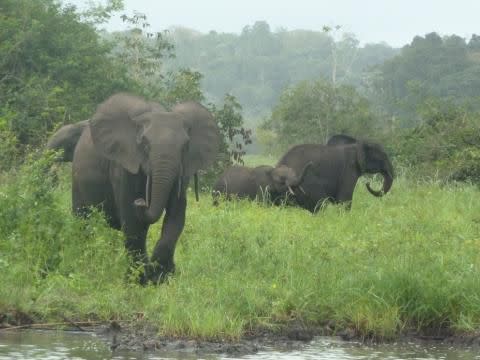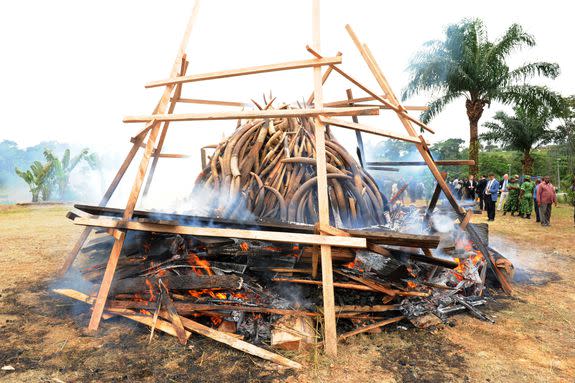Africa's elusive forest elephants are disappearing

The clock is ticking to save Central Africa's forest elephants.
Populations of the elusive elephants have plunged by around 80 percent inside one of the region's most important nature preserves.
Within Gabon's Minkébé National Park, poachers likely killed about 25,000 forest elephants for their ivory tusks between 2004 and 2014, according to a Duke University-led study in the journal Current Biology.
SEE ALSO: The world's fastest land animal is even more threatened than we thought
That's a significant number of animals, considering that Gabon holds about half of the estimated 100,000 forest elephants across all of Central Africa.

Image: john poulsen
"The loss of 25,000 elephants from this key sanctuary is a considerable setback for the preservation of the species," John Poulsen, an assistant professor of tropical ecology at Duke'd Nicholas School of the Environment, said Monday in a statement.
The dramatic population decline from one of Central Africa's largest, most remote protected areas "is a startling warning that no place is safe from poaching," he added.
Across the African continent, populations of all elephants have plummeted from about 1.3 million in the 1970s to less than 500,000 today due to poaching and habitat loss.
This week's dismal numbers from Gabon arrive in spite of a concerted effort by governments and conversationists to halt the illegal killing of elephants for their ivory, meat and other parts.

Image: Joel Bouopda Tatou/AP/REX/Shutterstock
In December, two major global conversation unions adopted resolutions to ban all domestic ivory sales, on top of existing bans on international ivory trading. China, the world's largest ivory market, said it plans to shut down its ivory trade by the end of 2017.
Gabon itself has also taken important steps to curb poaching, Poulsen said.
The government created a National Park Police force, elevated the conservation status of forest elephants to "fully protected," and doubled the national park agency's budget. In 2012, Gabon was the first African country to burn all its confiscated ivory — a gesture meant to snuff out the spike in poaching.
Yet Gabon's elephants are still vanishing, as the new research shows.
For their study, researchers estimated a population loss of between 78 and 81 percent by comparing data from two large-scale surveys of elephant dung in the Minkébé park, which were done in 2004 and 2014.
The team also used different analytical approaches to account for periods of heavy rainfall, which might've sped up the dung's decay and skewed the accuracy of the surveys.
Poulsen and his colleagues said that most poachers likely came from outside of Gabon, including the neighboring country of Cameroon.
The edge of Minkébé National Park lies just 3.8 miles from a major Cameroon road, which makes it easy for Camaroonese poachers to cross into Gabon, do their dirty work and bring their illegal haul back into Cameroon.
Poulsen and his colleagues urged governments in Central Africa to team up to stop illegal cross-border traffic, including by establishing new multinational protected areas and coordinating international law enforcement.
